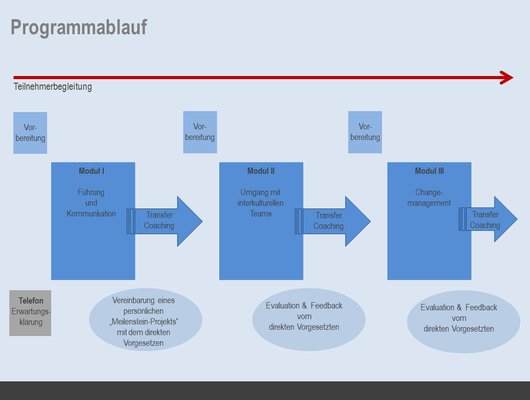02.01.2017
Leadership development – networked, international, intercultural

When mergers and amalgamations turn former national heavyweights into global players in their industry, successful cooperation at an international level is often the decisive factor for the expected future business success. Companies undergoing such a change in business strategy then realize that optimal processes and workflows are only a necessary condition for working efficiently across borders.
In order for projects to run smoothly across disciplines and cultural differences, a shared understanding of how to work together is becoming increasingly important. It is important to know what makes the other person “tick”, because in global projects, dealing with goal definition and feedback is often a cultural hurdle that must be overcome by the managers responsible. For HR work in this scenario, this necessarily means promoting the development of leadership skills interculturally and at an international level and ensuring that managers are well networked.
Multinational business needs a common management culture
Three years ago, our customer from the logistics sector took a similar approach to its HR development. The background was the ongoing organizational development and its objective of merging three regional organizations into one global unit. This made it urgent to develop and expand the skills of managers at a global level. What was needed was a global management program with a long-term focus on developing the organization’s top talents internationally and breaking down the barriers of intercultural teams. Experienced managers from the APAC, Europe, North and South America regions were approached, some of whom had already taken on global responsibility or were identified as having the potential to do so. Nominations are made by top management – both globally and regionally. Internally, the program is overseen by the Chief Human Resources Officer and his team. Both the CEO and the regional board members are involved in the content of the program. Against this background, Movendo Consulting was commissioned to develop a general leadership training program. The client’s wish list for the training program included complex, interwoven objectives:
- the development of a common understanding of leadership,
- Raising awareness of leadership responsibility – especially in contrast to management responsibility,
- and building a network of top global executives.
- What exactly are the challenges of a manager on a global level at our client?
- What long-term views and expectations on the topic of leadership exist on the Management Board?
- Key issues of leadership in an international context
- Getting to know different theoretical approaches
- “Looking over the shoulder” of colleagues
- Reflection on everyday challenges
Movendo trainings deliberately leave the usual training patterns to enable learning.
Right from the start, we encourage participants to get to know each other and consistently invest in building trust through explicit expectation management, role clarification and lots of open questions. We place the didactic focus in our training design in such a way that everyone interacts with each other quickly. And by consistently working with real cases and methods such as peer counseling and peer coaching, we maintain a balance between the training context and the dynamic reality of the participants. Based on the experience, similarities and differences between the simulation and the respective participants’ reality are reflected upon and exchanged. This reflection is supplemented and deepened by pragmatic models based on systems theory, which we develop in collaboration with the participants. We deliberately use classic flipcharts instead of prepared presentations. This allows us to integrate the language and examples of the participants and create an active learning atmosphere.
Individual transfer by the participants is crucial to the success of the development.
The involvement of direct line managers in the individual module preparation and during the transfer phases is also effective for everyday transfer. In their role, the line managers enable the participants to implement the program content in their environment. In each module, specific target agreements and transfer commitments are agreed with the participants, the achievement of which is reflected on in an evaluation with the line managers and also shared with the other participants in the follow-up module. As a reminder during the transfer phase, all participant results produced in the modules are available as a photo protocol. Practical Movendo handouts illustrate the theoretical models once again using exemplary leadership challenges and enable a pragmatic connection to the participants’ own situation. Each module also includes a fireside chat with top management. CEOs and regional board members engage in an open discussion about the training content and the current challenges of the respective markets. The three modules of the training program take place at different locations – one module each in Europe, Asia and the USA. This approach also reinforces intensive team building and creates short official channels by activating networks. This makes it easy to establish and use global contacts.
Sustainable, time- and location-independent transfer assurance with myMovendo.
The mobile learning platform myMovendo, developed by Movendo for everyday transfer, ideally supports the entire development process of program participants working all over the world. With this tool, optimized for mobile devices, we bring together all content elements (preparation tasks, photo log, handouts, reflections, target agreements) with the process elements (coaching, peer counselling) and offer long-term support for each participant – during the training periods and beyond. In addition, this platform supports the trusting cooperation between participants through joint work within peer coaching groups. Participant feedback on this tool is varied. They use myMovendo both as a central storage location and for active transfer support by managing their personal learning diary with tasks and peer exchanges from there.
The systemic structure of the program is what makes it so effective and sets the course for international talent management.
The program has been running successfully for three years and the client’s internal evaluation has confirmed that the participants in this program develop more successfully than other managers, despite multiple restructurings within the company. The programme has also proven to be a springboard for internationalizing careers. Global projects are now predominantly managed by graduates of our training program. And the recipe for success is being expanded. In the future, we plan to offer regional and cross-year follow-ups in order to further promote networking between participants from different years. Regional management development programmes are also being requested in order to develop a common understanding of leadership at all levels of the organization. Movendo consultants are now also active with the training in the North American and European regions.


